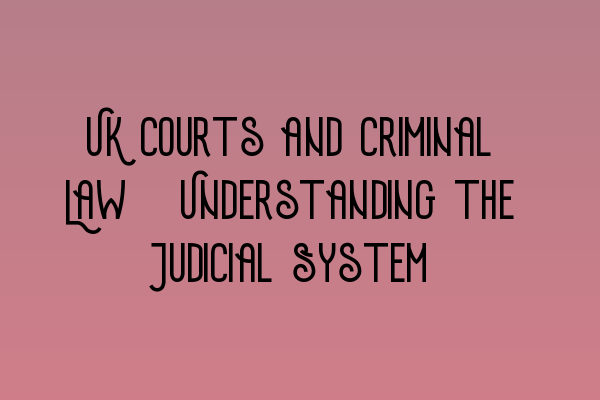UK Courts and Criminal Law: Understanding the Judicial System
As an expert criminal solicitor and writer at SQE Criminal Law & Practice Law UK, I aim to provide you with a comprehensive understanding of the UK courts and the criminal law judicial system. Whether you are a law student preparing for the SQE exams or someone interested in gaining knowledge about criminal law, this article will serve as a valuable resource.
The UK Courts: Structure and Hierarchy
The UK judicial system comprises several courts that play distinct roles in the administration of justice. At the apex is the Supreme Court, followed by the Court of Appeal, High Court, and the Crown Court. Each court has its unique jurisdiction and handles different types of cases.
Let’s delve deeper into each court:
The Supreme Court
The Supreme Court is the highest court of appeal in the UK for civil and criminal cases. It deals with matters of national importance and sets precedents that bind all lower courts. To understand the significance of the Supreme Court’s decisions, it’s crucial to stay updated with recent judgments.
The Court of Appeal
The Court of Appeal sits below the Supreme Court and primarily handles appeals from the Crown Court, as well as certain civil cases. It is divided into two divisions: the Criminal Division and the Civil Division. The Criminal Division focuses on criminal appeals and ensures that justice is upheld.
If you are preparing for the SQE 1 exams related to criminal law, our SQE 1 Practice Exam Questions and SQE 1 Practice Mocks FLK1 FLK2 articles will be immensely helpful.
The High Court
The High Court has both civil and criminal jurisdictions. It handles cases of considerable complexity, substantial value, and significant public importance. The High Court is divided into several divisions, including the Queen’s Bench Division, the Family Division, and the Chancery Division.
If you are interested in understanding the different legal concepts covered in the SQE exams, our comprehensive SQE 2 Preparation Courses will provide you with the necessary knowledge and practice.
The Crown Court
The Crown Court deals with serious criminal cases that are referred from the Magistrates’ Court for an indictment. It conducts trials involving indictable offenses and handles sentencing of convicted individuals. It ensures a fair trial and guarantees that justice is served.
For those preparing for the SQE 1 exams, our specialized SQE 1 Preparation Courses cover all the essential topics, including criminal law, evidence, and procedure.
Understanding Criminal Law: Basics and Procedures
To comprehend the UK’s criminal law system, it is vital to familiarize yourself with the basic principles and procedures in place. Criminal law encompasses various aspects, including criminal offenses, defenses, and sentencing.
The law pertaining to criminal offenses is extensive and covers crimes such as murder, theft, fraud, assault, and many more. It is essential to differentiate between offenses categorized as either summary offenses, triable either way offenses, and indictable offenses, as they have varying trial procedures and potential penalties.
The criminal law process involves the investigation, arrest, charge, trial, and potential appeal stages. Understanding the intricacies of each stage is crucial for any aspiring criminal solicitor or law student preparing for the SQE exams.
Stay Updated and Well-Informed
As the legal landscape is constantly evolving, staying updated with legal developments is crucial to excel in the field. The SRA SQE Exam Dates play a pivotal role in determining your exam preparation timeline and should be well-noted to ensure you are adequately prepared.
At SQE Criminal Law & Practice Law UK, we are committed to providing aspiring solicitors and law students with the resources and guidance they need to succeed. With our expertise and comprehensive study materials, you can confidently prepare for the SQE exams and navigate the challenges of the UK courts system.
For further information, browse our related articles and courses:
